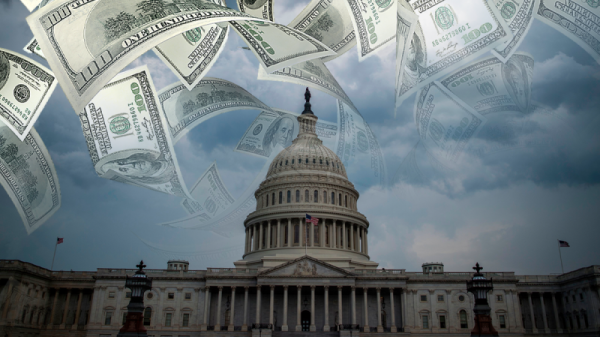Rep. Bob Good (Va.) was one of the Republicans who quickly cast his vote in support of Rep. Jim Jordan’s (R-Ohio) bid for House speaker Tuesday afternoon. Most Republicans did, of course, but more than enough didn’t — stymieing Jordan’s ascent.
Good appears to have found this somewhat baffling. After all, as he told reporter Ben Jacobs, this wasn’t like January, when the caucus was dragging its feet on approving the “very unpopular” Rep. Kevin McCarthy (R-Calif.) to serve in the top position in the House. Jordan is “the second-most-popular Republican in the country,” someone that his colleagues should presumably line up behind.
Except, of course, that he isn’t.
Claims like that one are generally tricky to adjudicate. After all, “popularity” is measured in different ways at different times among different groups. Good might mean Jordan’s the second-most-popular Republican in Congress or that he’s the second-most-popular Republican among Republicans or that he’s the second-most-popular Republican among all Americans. It’s not clear. (A request for clarification from Good’s office did not receive a response by the time this article published.)
Let’s assume that he means the most obvious interpretation: that Jordan is the second-most-popular Republican among American Republicans. If so, we have some good news: YouGov polling published this month actually has Jordan as the most popular Republican, among those with an opinion. Of Republicans who have an opinion of Jordan, 95 percent view him favorably or very favorably. That tops former president Donald Trump’s 82 percent — the Republican to whom Good was probably referring as the most popular Republican.
But there’s a catch. Only just over half of Republicans have an opinion of Jordan. Among the Republican legislators included in YouGov’s poll, Jordan was the third least recognized, trailing only Reps. Kevin Hern (R-Okla.) and Patrick T. McHenry (R-N.C.), who is serving as speaker pro tempore.
Looking only at Republicans who have an opinion doesn’t really make sense in this context; if half of Republicans haven’t heard of Jordan, is it fair to say that he’s more popular than Trump?
If we simply look at the raw percentage of Republicans that view the legislators positively, Jordan drops to third behind Florida Gov. Ron DeSantis (R).
Now another caveat: That’s third … out of the nine Republicans included in this poll. In another YouGov poll, released last month, former ambassador Nikki Haley was viewed favorably by 54 percent of respondents. That’s more than Jordan, though not to a statistically significant degree. Sen. Tim Scott (R-S.C.) was also about as popular as Jordan in that poll.
We might introduce another complication here. Good’s assertion of Jordan’s popularity depends on excluding a lot of Republicans who might not be included in recent polls. Is Jordan more popular than Sean Hannity? (He isn’t more popular than Hannity was in April.) Is he more popular than Arnold Schwarzenegger? Than Clint Eastwood?
Then, of course, we factor in one reason McCarthy was unpopular in January: Party leaders, particularly on the Republican side, tend to see their support erode as they hold those positions. Happened to John A. Boehner; happened to Paul D. Ryan. Being the embodiment of the establishment in an anti-establishment party is bad for your popularity — unless you manage the Trumpian pirouette in which you somehow retain outside status despite having served as president.
Jordan’s allies have been applying pressure on wary legislators by encouraging rank-and-file Republicans (explicitly or tacitly) to contact their members of Congress. Creating a sense that Jordan is hugely popular provides cover for a barrage of calls those legislators are receiving.
Ken Buck of Colorado, who voted against Jordan, tells @jaketapper of the pressure campaign Jordan allies have unleashed on Republicans: “The calls that are coming in are ridiculous. They’re in the hundreds if not thousands that are coming into office right now.”
— Catie Edmondson (@CatieEdmondson) October 17, 2023
Jordan got good reviews from Republicans — at least those who had heard of him — before running for speaker. It will be interesting to see how popular he is after having done so.
Of course, he already did get the results of one evaluation of his popularity Tuesday, and they were not what he wanted.
Rep. Bob Good (Va.) was one of the Republicans who quickly cast his vote in support of Rep. Jim Jordan’s (R-Ohio) bid for House speaker Tuesday afternoon. Most Republicans did, of course, but more than enough didn’t — stymieing Jordan’s ascent.
Good appears to have found this somewhat baffling. After all, as he told reporter Ben Jacobs, this wasn’t like January, when the caucus was dragging its feet on approving the “very unpopular” Rep. Kevin McCarthy (R-Calif.) to serve in the top position in the House. Jordan is “the second-most-popular Republican in the country,” someone that his colleagues should presumably line up behind.
Except, of course, that he isn’t.
Claims like that one are generally tricky to adjudicate. After all, “popularity” is measured in different ways at different times among different groups. Good might mean Jordan’s the second-most-popular Republican in Congress or that he’s the second-most-popular Republican among Republicans or that he’s the second-most-popular Republican among all Americans. It’s not clear. (A request for clarification from Good’s office did not receive a response by the time this article published.)
Let’s assume that he means the most obvious interpretation: that Jordan is the second-most-popular Republican among American Republicans. If so, we have some good news: YouGov polling published this month actually has Jordan as the most popular Republican, among those with an opinion. Of Republicans who have an opinion of Jordan, 95 percent view him favorably or very favorably. That tops former president Donald Trump’s 82 percent — the Republican to whom Good was probably referring as the most popular Republican.
But there’s a catch. Only just over half of Republicans have an opinion of Jordan. Among the Republican legislators included in YouGov’s poll, Jordan was the third least recognized, trailing only Reps. Kevin Hern (R-Okla.) and Patrick T. McHenry (R-N.C.), who is serving as speaker pro tempore.
Looking only at Republicans who have an opinion doesn’t really make sense in this context; if half of Republicans haven’t heard of Jordan, is it fair to say that he’s more popular than Trump?
If we simply look at the raw percentage of Republicans that view the legislators positively, Jordan drops to third behind Florida Gov. Ron DeSantis (R).
Now another caveat: That’s third … out of the nine Republicans included in this poll. In another YouGov poll, released last month, former ambassador Nikki Haley was viewed favorably by 54 percent of respondents. That’s more than Jordan, though not to a statistically significant degree. Sen. Tim Scott (R-S.C.) was also about as popular as Jordan in that poll.
We might introduce another complication here. Good’s assertion of Jordan’s popularity depends on excluding a lot of Republicans who might not be included in recent polls. Is Jordan more popular than Sean Hannity? (He isn’t more popular than Hannity was in April.) Is he more popular than Arnold Schwarzenegger? Than Clint Eastwood?
Then, of course, we factor in one reason McCarthy was unpopular in January: Party leaders, particularly on the Republican side, tend to see their support erode as they hold those positions. Happened to John A. Boehner; happened to Paul D. Ryan. Being the embodiment of the establishment in an anti-establishment party is bad for your popularity — unless you manage the Trumpian pirouette in which you somehow retain outside status despite having served as president.
Jordan’s allies have been applying pressure on wary legislators by encouraging rank-and-file Republicans (explicitly or tacitly) to contact their members of Congress. Creating a sense that Jordan is hugely popular provides cover for a barrage of calls those legislators are receiving.
Ken Buck of Colorado, who voted against Jordan, tells @jaketapper of the pressure campaign Jordan allies have unleashed on Republicans: “The calls that are coming in are ridiculous. They’re in the hundreds if not thousands that are coming into office right now.”
— Catie Edmondson (@CatieEdmondson) October 17, 2023
Jordan got good reviews from Republicans — at least those who had heard of him — before running for speaker. It will be interesting to see how popular he is after having done so.
Of course, he already did get the results of one evaluation of his popularity Tuesday, and they were not what he wanted.





















